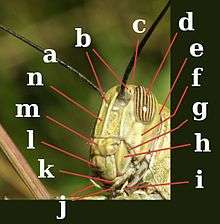frons
English

Noun
frons
- (anatomy) In vertebrates, especially mammals, the forehead; the part of the cranium between the orbits and the vertex.
- (entomology) The front part of the epicranium or head capsule of many insects; generally speaking the frons is the area below or between the antennae and above the clypeus. Generally it lies between the genal or "cheek" areas on either side of the head.
Part or all of this entry has been imported from the 1913 edition of Webster’s Dictionary, which is now free of copyright and hence in the public domain. The imported definitions may be significantly out of date, and any more recent senses may be completely missing.
(See the entry for frons in Webster’s Revised Unabridged Dictionary, G. & C. Merriam, 1913.)
Latin
Pronunciation
- (Classical) IPA(key): /frons/, [frõːs]
Etymology 1

From Proto-Indo-European *bʰron-t- (compare Irish braine (“prow, edge”), Old Norse brandr (“sword blade”)), from *bʰren- (“project”). See below.
Noun
frōns f (genitive frontis); third declension
- (anatomy) forehead
- brow, countenance (as an indicator of feelings)
- front, facade
- foremost part of anything
- cover (of a book or scroll)
- circumference (of a wheel)
- (figuratively) outside, exterior, appearance
Inflection
Third declension i-stem.
| Case | Singular | Plural |
|---|---|---|
| Nominative | frōns | frontēs |
| Genitive | frontis | frontium |
| Dative | frontī | frontibus |
| Accusative | frontem | frontēs |
| Ablative | fronte | frontibus |
| Vocative | frōns | frontēs |
Descendants
Etymology 2
From Proto-Indo-European *bʰron-d- (compare Old English brant (“steep”), Latvian bruôds (“roof ridge”), from *bʰren- (“project”).
Noun
frōns f (genitive frondis); third declension
Inflection
Third declension i-stem.
| Case | Singular | Plural |
|---|---|---|
| Nominative | frōns | frondēs |
| Genitive | frondis | frondium |
| Dative | frondī | frondibus |
| Accusative | frondem | frondēs |
| Ablative | fronde | frondibus |
| Vocative | frōns | frondēs |
Related terms
Descendants
References
- frons in Charlton T. Lewis and Charles Short (1879) A Latin Dictionary, Oxford: Clarendon Press
- frons in Charlton T. Lewis (1891) An Elementary Latin Dictionary, New York: Harper & Brothers
- frons in Charles du Fresne du Cange’s Glossarium Mediæ et Infimæ Latinitatis (augmented edition, 1883–1887)
- frons in Gaffiot, Félix (1934) Dictionnaire Illustré Latin-Français, Hachette
- Carl Meissner; Henry William Auden (1894) Latin Phrase-Book, London: Macmillan and Co.
- to frown: frontem contrahere (opp. explicare)
- to beat one's brow: frontem ferire, percutere
- one can see it in his face: in fronte alicuius inscriptum est
- not to betray one's feelings by one's looks: sententiam fronte celare, tegere
- to frown: frontem contrahere (opp. explicare)